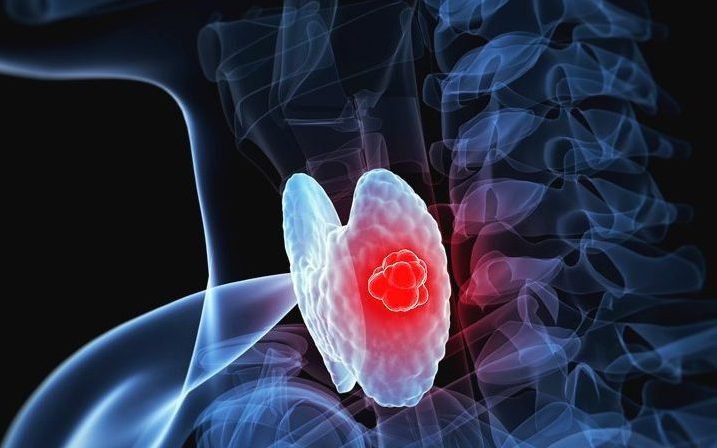According to popular believe, the diseases of thyroid gland are one of the leading cause of obesity. But such an easy formulation can be inappropriate in some individual cases.
Thyroid gland and its functions
Thyroid gland is a butterfly shaped organ.
Thyroid hormones regulate body temperature, muscular strength, proper working of cardiovascular system, respiratory system, reproduction and body mass.
Obesity
Obesity is a chronic disease characterized by accumulation of excess fat.
It's related to increase risks of such a serious diseases as are: heart pathologies, high blood pressure, diabetes, cancers of certain organs.
Relationship between thyroid gland and body mass
This connection is very tight. Thyroid hormones regulate making energy from the food we consume and using this energy by our body.
More specifically they control basal metabolism (this is the energy usage by body while at rest to maintain vital functions such as breathing and keeping warm), also lipid and carbohydrate metabolism and appetite.
So changes in thyroid hormone level affects body weight.
But must be considered many other hormones, proteins and chemical substrates are involved in these processes, which makes it difficult to define how affected thyroid function will exactly change body weight.
Changes in body weight during hyperthyroidism
Hyperthyroidism or overactive thyroid is when the thyroid makes and releases more thyroid hormones than the body needs.
High level of thyroid hormones causes increasing of their effects too. It means that basal metabolism, calorie usage and demand on it is increased. So big appetite appears.
Weight loss is in the list of hyperthyroidism symptoms. It doesn't always exists, but when happens it can be quite dramatic.
Increased appetite sometimes can lead to weight gain. It depends on how much extra calories are used.
After successful treatment of hyperthyroidism all the lost weight is back. So weight loss effect can't be maintained.
Changes in body weight during hypothyroidism
HYPOTHYROIDISM is state when thyroid gland is unable to make and release enough of its hormones.
Obesity is among frequent symptoms of hypothyroidism.
When the patient is overweight or obese thyroid function assessment is often done in hope to detect the primary cause of obesity or of failure to achieve weight loss.
Thyroid hormone deficiency really can increase the risks of gaining extra weight due to decreased basal metabolism.
More specifically exact cause of weight gain may become following factors:
- decreased need for resting energy which reduces fat catabolism and grow its storage
- reduced level of physical activity due to fatigue and other symptoms of underactive thyroid
- fluid retention which is common characteristic for hypothyroidism.
Despite these effects, marked weight gain due to hyperthyroidism mainly isn't seen. Most people usually gain around 5 kgs. So treatment of hypothyroidism alone without lifestyle interventions can't be enough to achieve desired loss of weight.
If there are no other symptoms of hypothyroidism besides obesity, more likely weight gain isn't caused by thyroid dysfunction.
Also, if after successful treatment of hypothyroidism every other symptoms are gone, but weight isn't decreased, the chance that hypothyroidism is responsible for obesity is low.
In any case, we must remember that the etiology of obesity is complex and hypothyroidism should not be considered the sole cause of excess weight.
However, there are also many patients with hypothyroidism who are of normal weight.
So the hope shouldn't be given to patients that they will loss their weight just by the treatment of hypothyroidism without lifestyle interventions. Because in such cases weight loss is often minimal or even zero.
The impact of obesity on thyroid gland
Last years researches show that the obesity itself can be cause of thyroid dysfunction.
More specifically:
- obesity can increase TSH level
- increases risks of developing hypothyroidism
- rises risks for autoimmune thyroid disorders especially in children
- causes structural changes within thyroid gland and its enlargement
- increases risks of developing thyroid nodules including cancers
More information about this topic is given in the following article for doctors: The impact of obesity on thyroid gland
The impact of thyroid medications on body mass
During past years thyroid medications were actively used to loss weight.
Today, this is no longer an accepted practice, as having too much thyroxine in the body can lead to serious side effects, including bone, cardiovascular, and other organ system disorders.
In addition, after stopping taking the drug, the weight lost thanks to it returns.
Important thing is that some patients prove that after starting the treatment for hypothyroidism the body mass is increasing markedly. But nowadays we don't have any scientific evidence to tell that thyroid medications can cause weight gain.
It's thought that coexistence of some diseases can cause transformation of T4 to its less active form rT3. More researches are needed to make clear this issue.
Author: Elga Giorgadze (MD of Endocrinology)







Hey, I just tried hitclun and it’s pretty cool. Easy to navigate. hitclun
Hey, heard about 49jilli? Gonna check it out and see what all the fuss is about! Looks promising. Thinking of signing up soon. 49jilli
Hey guys, what’s your take on nh88com? Seen a lot of ads for them lately. Any experiences you’d like to share? I’m always looking for the next best thing. nh88com